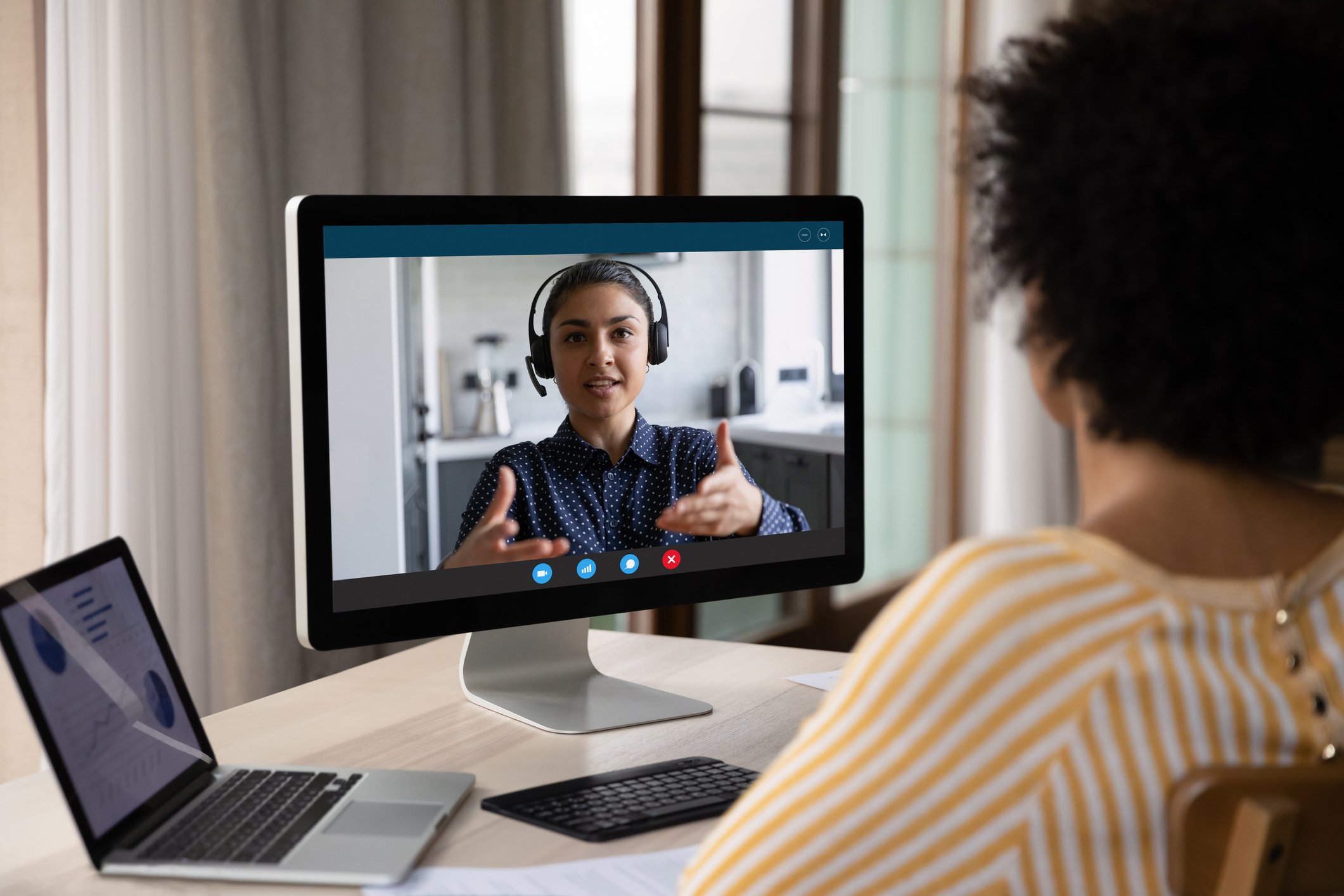Interviews on Videoconference Platforms
By Janet Salmons, PhD
Dr. Salmons is the author of books about online research, including Doing Qualitative Research Online (2022). Use the code COMMUNIT24 for a 25% discount when you order books from Sage.
Thinking about conducting interviews on a videoconferencing platform?
In some parts of the world, jumping on a video call is a natural part of communications in our work and personal lives. For others, access to stable broadband is a limiting factor. If you proceed with on-camera videoconference interviews, clearly, anonymity can’t be assured, so safeguarding recordings is critical. However, not all platforms allow you to record directly to your hard drive where you can protect them. These and other questions come into play when we consider videoconference platforms for scholarly interviews.
Here are some questions to consider:
Data and Data Collection: Will you collect and analyze visual, verbal, and/or text data?
Will you transcribe participants’ responses and analyze the text, or will you include observations of the participants and their settings, and analyze visual data?
If you are collecting visual data, will you require use of camera throughout the interview?
How will you deal with participants who turn cameras off?
Will you request that participants allow you to see their settings, or allow virtual backgrounds?
If you are conducting observations in conjunction with interviews, will you use an observation guide?
Participants
Do participants have access to computers or devices with cameras?
Do participants have Internet access with the bandwidth needed to participate in a videoconference?
Do participants have digital literacy skills needed to participate in a videoconference?
Will you exclude participants who lack the access or ability to communicate by videoconference, or allow them to communicate in another way?
Are participants willing to be seen on camera?
Can interviews be conducted in a private, quiet location?
Platform Features
Does the platform offer interactive features such as shared whiteboards or applications?
Will you use text chat as well as audio-visual features?
Data Protection
Does the platform allow you to record to your hard drive, which you can protect, or only to the company’s server or the cloud, which you cannot protect?
Informed Consent for Video Interviews
Inform participants about who will have access to the video data.
Negotiate preferred use of cameras, backgrounds, and any observations of the setting.
Discuss the importance of communicating presence of other people in the room, or other circumstances not visible to the researcher. Researchers studying sensitive topics might want to establish a “safe word” or signal to indicate presence of another person or other threat.
Will you offer the chance to log in ahead of the interview to review features, set up cameras and choose setting?
Researchers discuss their experiences with videoconference interviews
Goldberg, J. H., & Schryver, J. C. (1993). Eye-Gaze Control of the Computer Interface: Discrimination of Zoom Intent. Proceedings of the Human Factors and Ergonomics Society Annual Meeting, 37(19), 1370-1374. https://doi.org/10.1518/107118193784162272 (Open access version here.)
Abstract. An analysis methodology and associated experiment were developed to assess whether definable and repeatable signatures of eye-gaze characteristics are evident, preceding a decision to zoom-in, zoom-out, or not to zoom at a computer interface. This user intent discrimination procedure can have broad application in disability aids and telerobotic control. Eye-gaze was collected from 10 subjects in a controlled experiment, requiring zoom decisions. The eye-gaze data were clustered, then fed into a multiple discriminant analysis (MDA) for optimal definition of heuristics separating the zoom-in, zoom-out, and no-zoom conditions. Confusion matrix analyses showed that a number of variable combinations classified at a statistically significant level, but practical significance was more difficult to establish. Composite contour plots demonstrated the regions in parameter space consistently assigned by the MDA to unique zoom conditions. Peak classification occurred at about 1200-1600 msec. Improvements in the methodology to achieve practical real-time zoom control are considered.
Learn more about online research! Register now for a May 7, 2024 webinar with Dr. Salmons from the Center for Advanced Internet Studies.
Khan, T. H., & MacEachen, E. (2022). An Alternative Method of Interviewing: Critical Reflections on Videoconference Interviews for Qualitative Data Collection. International Journal of Qualitative Methods, 21. https://doi.org/10.1177/16094069221090063
Abstract. Qualitative research is an increasingly popular research approach for tackling the evolving complexity of social issues. With this rise in use, methods of qualitative data collection are becoming highly diverse, moving away from conventional approaches and welcoming more innovative and creative methods of data collection in a quest to produce critically and theoretically engaged new knowledge. Although traditional face-to-face interviews remain a compelling and popular means, modern innovative technology-based interviewing, such as videoconference interviews, can play a pivotal role in qualitative research. This article argues that this approach is pragmatic because video conferencing interviews are relatively affordable for research teams and, for many research participants, they are more accessible than face-to-face interviews. On the other hand, it provides a unique opportunity for researchers and participants by compressing the time-space divide, facilitating safety, reducing travel-related expenses, accessing transnational participants, maintaining social distance, and protecting personal space and privacy. Yet, this article also argues that videoconferencing can be dogged by practical challenges that might conflict with the holistic quality of qualitative research, such as dropped calls and loss of intimacy compared to traditional in-person interviews. This article presents the experiences of a young researcher, who reflects on how and why he conducted Skype interviews in his research. The article concludes that, despite the relative merits and demerits, videoconference interviews can be a useful supplement or replacement for traditional face-to-face interviews. However, more research is needed to gain a robust understanding of how this type of interview meets basic assumptions about the quality of interviews and affects the overall rigor of qualitative research.
Lindsay, S. (2022). A Comparative Analysis of Data Quality in Online Zoom Versus Phone Interviews: An Example of Youth With and Without Disabilities. SAGE Open, 12(4). https://doi.org/10.1177/21582440221140098
Abstract. Qualitative researchers are increasingly using online data collection methods, especially during the COVID-19 pandemic. I compared the data quality (i.e., interview duration, average number of themes and sub-themes, and inaudible words) of 34 interviews (29 conducted by Zoom (16 with camera on, 13 camera off) and 5 conducted by phone) drawn from a study focusing on youth’s coping experiences during the pandemic. Findings showed that phone interviews had a longer duration compared to Zoom. However, phone interviews had a similar average word count to Zoom interviews (with the camera on). Zoom interviews conducted with the camera off were shorter in duration than interviews with the camera on. The number of themes was similar across the different interview formats but there were fewer sub-themes for Zoom interviews with the camera off. The findings suggest that Zoom interviews conducted with the camera off could affect the data quality. This research also emphasizes the importance of giving participants choice in the format of their interview to allow for optimal sharing of experiences while enhancing the equity, diversity and inclusion of the participants.
Lobe, B., Morgan, D. L., & Hoffman, K. (2022). A Systematic Comparison of In-Person and Video-Based Online Interviewing. International Journal of Qualitative Methods, 21. https://doi.org/10.1177/16094069221127068
Abstract. Due to the increasing popularity of online qualitative interviewing methods, we provide a systematically organized evaluation of their advantages and disadvantages in comparison to traditional in-person interviews. In particular, we describe how individual interviews, dyadic interviews, and focus groups operate in both face-to-face and videoconferencing modes. This produces five different areas for comparison: logistics and budget, ethics, recruitment, research design, and interviewing and moderating. We conclude each section with set of recommendations, and conclude with directions for future research in online interviewing.
Maia, I. (2023). How to Overcome the Secretiveness of a Group: Opportunities of Online Interviews. Sociological Research Online, 0(0). https://doi.org/10.1177/13607804231168253
Abstract. In a pandemic, qualitative methodologies and in-person interviews, the key to understanding the experiences lived by participants in social phenomena, proved to be ill-suited. As a result of the restrictions imposed during this period, the challenge was even more considerable in the research of groups and practices marked by secretiveness and self-closing, in that our presence in the field, always marked by hurdles, was impracticable. In this text, we propose a reflection on the experience of conducting online interviews with university students (Porto, Portugal) involved in praxe (hazing), a complex and multidimensional social phenomenon that profoundly shapes academic life in Portuguese universities. We will discuss the differences between holding in-person interviews before the pandemic and online interviews during the lockdown. We draw attention to practical, methodological, and ethical considerations in adapting research to an online context and conclude that, despite the challenges, online interviews opened up surprising opportunities for collecting these students’ experiences.
Oliffe, J. L., Kelly, M. T., Gonzalez Montaner, G., & Yu Ko, W. F. (2021). Zoom Interviews: Benefits and Concessions. International Journal of Qualitative Methods, 20. https://doi.org/10.1177/16094069211053522
Abstract. COVID-19 restrictions have transitioned in-person qualitative research interviews to virtual platforms. The purpose of the current article is to detail some benefits and concessions derived from our experiences of using Zoom to interview men about their intimate partner relationship breakdowns and service providers who work with men to build better relationships. Three benefits; 1) Rich therapeutic value, 2) There’s no place like home, and 3) Reduced costs to extend recruitment reach and inclusivity, highlighted Zoom’s salutary value, the data richness afforded by being interviewed from home, and the potential for cost-effectively progressing qualitative study designs. In particular, reduced labour and travel costs made viable wider reaching participant recruitment and multi-site data collection. The concessions; 1) Being there differently, 2) Choppy purviews and 3) Preparing and pacing, and adjusting to the self-stream revealed the need for interviewers to nimbly adjust to circumstances outside their direct control. Included were inherent challenges for adapting to diverse interviewee locations, technology limits and discordant audio-visual feeds. Amongst these concessions there was resignation that many in-person interview nuances were lost amid the virtual platform demanding unique interviewer skills to compensate some of those changes. Zoom interviews will undoubtedly continue post COVID-19 and attention should be paid to emergent ethical and operational issues.
Prior, A., & Lachover, E. (2023). Online Interview Shocks: Reflecting on Power Relations in Online Qualitative Interviews. International Journal of Qualitative Methods, 22. https://doi.org/10.1177/16094069231211201
Abstract. The use of online camera-based interviews (OCBI) in qualitative studies is increasing. While recent studies have addressed the benefits and limitations of this method, scholarship still lacks an understanding of it beyond the technicalities. The present study explores how the online setting shapes power relations in qualitative OCBI. The data includes 52 OCBI that were conducted in two different qualitative studies. By applying the concept of interview shocks to the analysis, we gained a deep understanding of how surprising incidents and unexpected moments that occurred during the interviews revealed the role online settings play in shaping the power relations between interviewers and interviewees in OCBI. We identified three types of online interview shocks: the shocking use of the camera, the shocking presence of others during the interview, and the shocking body dispositions in online interviews. The findings demonstrate the different ways that both interviewers and interviewees use the online setting functionalities, or the affordances of OCBI, to position and negotiate their social-cultural-political stand within the interview. Furthermore, the findings uncover the socio-cultural-political context within which the power relations were shaped in OCBI. Thus, we argue that the online setting is yet another aspect that interacts dynamically with the interviewers’ and interviewees’ social locations in shaping the power relations in OCBI. We conclude by highlighting the importance of further studying the qualities of OCBI as a distinct qualitative method that is valid even when other options are available.
Van Zeeland, I., Van den Broeck, W., Boonen, M., & Tintel, S. (2021). Effects of digital mediation and familiarity in online video interviews between peers. Methodological Innovations, 14(3). https://doi.org/10.1177/20597991211060743
Abstract. In times of social distancing, we need to adapt some of our research methods. Methodologies in field research can be partly replaced by a combination of online methods, which will often include online interviews. Technologically, there are few limitations to conducting interviews online, but there are side effects to digital mediation: privacy related concerns, technology hiccups, and physical distance may be barriers to disclosure for the interviewee. A survey among master students who had conducted interviews online confirmed these negative effects on the flow of interviews. Barriers to disclosure may be overcome by introducing familiarity and role-sharing. We tested the methodology of duo interviews via online video-calling tool Skype. In duo interviews, two respondents who know each other, interview each other in absence of a researcher. This explorative study investigated the effects of digital mediation on the flow of interviews and possible mitigation by familiarity between interviewer and interviewee. The qualitative study’s respondents were mostly experienced interviewers who knew each other well and were also experienced in using online video-calling tools, which reduced the influence of variation in technical and interviewing skills. The focus of the study was on finding conditions for the use of the familiarity strategy in online interviews. While familiarity between interview participants was reported to positively affect disclosure, the use of this method is limited to specific interview purposes. An unexpected finding was that the absent researcher was, in fact, present in the interview due to the element of video-recording. We list recommendations and conditions for conducting duo interviews over online video-calling tools, as well as limitations.
Wakelin, K. J., McAra-Couper, J., & Fleming, T. (2024). Using an Online Platform for Conducting Face-To-Face Interviews. International Journal of Qualitative Methods, 23. https://doi.org/10.1177/16094069241234183
Abstract. Semi-structured interviews are useful for exploring participants experiences, understandings, and opinions on a particular issue. Traditionally, interviews have taken place in-person however, because of in-person restrictions with Covid-19, and with the changing landscape of online connection, opportunities have arisen for how to conduct interviews using an online platform. The purpose of this article is to highlight the first author’s experiences with using an online platform to conduct face-to-face interviews and the valuable contribution that online interviewing could offer as a valid research tool that differs to that of in-person face-to-face interviews. Online semi-structured interviews were conducted with fourteen midwives and five pregnant people from New Zealand using Microsoft Teams. Interviews were videorecorded and conducted as part of a larger mixed methods multiphase study to explore participants experiences with how they use communication technology to connect with one another. The interviews took place between September 2022 – May 2023. Two key areas which highlight the benefits and challenges with online interviews were identified. These were around the potential to ‘capture the essence of the person’ and through the flexibility of the technology in enabling FTF connections. Challenges were also noted around connectivity issues. Videorecording online interviews offered an ability to capture the ‘essence of the person’ through visual and auditory cues. These same cues were shown to assist with lipreading when transcribing inaudible words which can assist in the analysis of data. There were disruptions to some interviews due to interviewing taking place in the person’s home and connectivity issues, however, these were felt to be minimal. Online interviewing should not be considered a ‘poor relation’ to in-person face-to-face interviews, but instead, a valuable option that contributes towards the growing body of knowledge around online interviewing as a valid research tool that is different from face-to-face.
Żadkowska, M., Dowgiałło, B., Gajewska, M., Herzberg-Kurasz, M., & Kostecka, M. (2022). The Sociological Confessional: A Reflexive Process in the Transformation From Face-To-Face to Online Interview. International Journal of Qualitative Methods, 21. https://doi.org/10.1177/16094069221084785
Abstract. This aim of the article is to reflect on a new quality in the researcher-participant relationship caused by the transformation from a face-to-face to an online interview (on the Zoom platform during two first waves of the COVID-19 pandemic). It reports methodological learnings from autoethnography. The concept of an interaction order (Goffman) provides a theoretical lens through which the researcher-participant encounter is being analysed. The study is based on the reflections referring to 31 online in-depth interviews with women (mothers in an ‘empty nest’) conducted by a team of five female researchers. Online research was depicted in literature as an option of a second choice for conducting qualitative studies before 2020 and an online methodology as one in need to be tested. In order to provide the context of our methodological learnings, we will present an overview of our study. Our study consisted of 31 online in-depth interviews with women (mothers in an ‘empty nest’) and was conducted by a team of five female researchers. After having reflected on our experience from the field, called ‘the sociological confessional’, we claim that online interviews have potential to be the option of the first choice to conduct in-depth interviews. We do not see the lack of immediate presence in remote interviews as a setback. On the contrary, we believe that thanks to introducing practices of care about the participant, the revised methodology not only meets the criteria of the qualitative IDI standards, but diminishes emotion work (Hochschild, 1983) on the part of the researcher as well. We find our ‘report from the field’ unique: (1) our study was not planned to be conducted online and (2) it has succeeded in gathering equivalent data during the first stage of the pandemic.
Learn more! Books about collecting and analyzing visual or video data.
Use the code COMMUNIT24 for a 25% discount when you purchase directly from Sage.






































Informed consent is the term given to the agreement between researcher and participant. In this post Janet Salmons offers suggestions about the intersections of the Internet communications, ethics and participants.